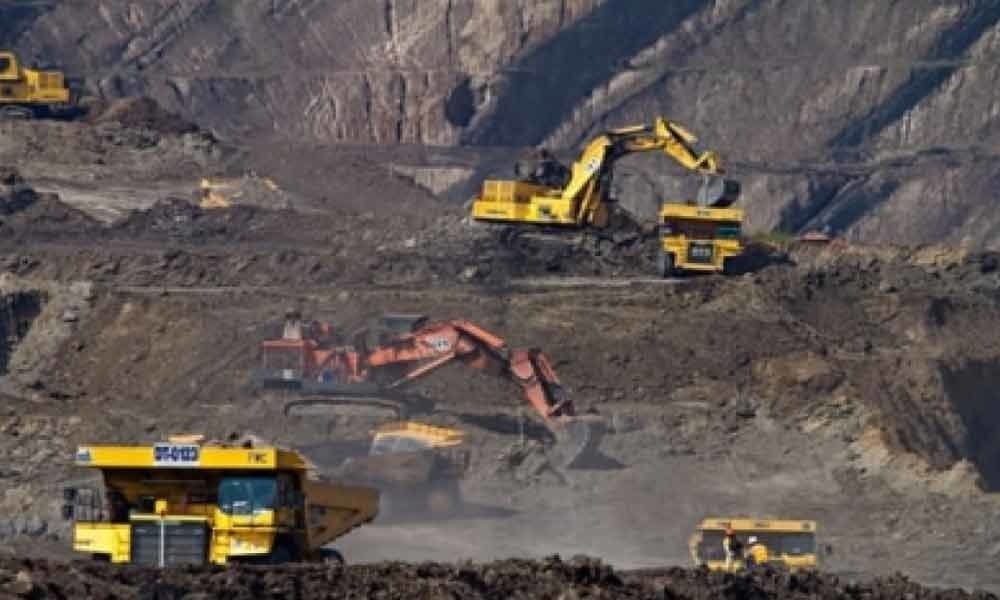Live
- Nizamabad MP Dharmapuri Arvind and Jagtial MLA Dr. Sanjay Kumar Meet CM Revanth Reddy
- Hyderabad CP CV Anand Issues Stern Warning to Bouncers
- MP Laxman Criticizes Police Conduct, Calls for Support for Victims' Families
- Fire Breaks Out in Kachiguda-Chennai Egmore Express, Passengers Evacuated Safely
- CM Revanth Reddy Condemns Attacks on Film Personalities' Homes, Calls for Strict Action
- Victory Venkatesh and Nandamuri Balakrishna to Set Screens on Fire with Unstoppable Season 4
- Over 71.81 crore Ayushman Bharat Health Account numbers generated: Centre
- In special gesture, Kuwait's Prime Minister sees-off PM Modi at airport after conclusion of historic visit
- Veer crowned PGTI Ranking champion, Shaurya wins emerging player honour
- Sr National Badminton: Unseeded Rounak Chauhan, Adarshini Shri reach singles semis
Just In
Reports: India's coal-fired energy sector is under risk due to water shortage


New Delhi: India's coal-fired energy sector is facing increasing pressure due to generator over-capacity, water shortages and the rise of low-cost...
New Delhi: India's coal-fired energy sector is facing increasing pressure due to generator over-capacity, water shortages and the rise of low-cost renewables, a report by the US-based Institute for Energy Economics and Financial Analysis (IEEFA) and the Applied Economics Clinic (AEC) said on Wednesday.
The report -- 'Risks Growing for India's Coal Sector' -- provides an overview of the ongoing challenges facing India's coal-fired generators due to changes in the energy sector, fluctuations in water supply and stranded-assets as well as other risks.
"The energy landscape has changed dramatically in recent years and there are increasing stressors, particularly on the thermal coal sector, that require urgent attention, water being one of the most prominent," said David Schlissel, co-author and IEEFA's Director of Resource Planning Analysis.
The report details three major challenges that are expected to only intensify in the years ahead.
The first challenge is the over-building of coal-fired capacity. The boom in coal plant construction during the early 2010s has resulted in significant over-capacity.
The amount of installed coal-fired capacity in India is now 20 per cent higher than the country's peak demand level and fully 50 gigawatts (GW) above average demand levels.
The second challenge is the declining water supplies.
Groundwater levels across India are in decline. Since 2012, both total annual rainfall and monsoon rainfall have generally been below normal levels -- a major concern for coal generation, which requires substantial amounts of water for steam production and cooling.
And the third challenge involves the increasing competition from renewables, particularly during the monsoon season.
Low-cost renewable energy has a great advantage during the monsoon season, when coal generation dips while wind and hydro generation peaks.
"India's overbuilt coal power capacity has left two related problems. First, utilisation rates have fallen, impairing the economic competitiveness of coal plants because they must spread their costs over a diminishing number of kilowatt-hours," said Bryndis Woods, researcher at the Applied Economics Clinic (AEC) and co-author of the report.
"Second, over-capacity has burdened the system as a whole since the plants' capital costs still need covering even if their electric output is not needed."
Ongoing water shortage problems in India forced 61 plant shutdowns from 2013-2017, resulting in roughly 17,000 gigawatt-hours of lost generation and revenue.
Water-related problems are projected to worsen as the impact of climate change continues to exacerbate the duration and severity of both flooding and drought.
About 41GW of India's installed thermal capacity is located in drought-affected areas, with about 37GW located in "extreme drought" areas, according to the report.
Another main factor in the energy shift is the wave of new renewable capacity planned for India, 275GW by 2027 and as much as 500GW by 2030.
Prices for onshore and offshore wind and solar are expected to continue declining while prices for coal-fired generation are likely to rise.
All solar and wind auction prices in India since June 2018 have come in below 3.29 Rs/kWh, less than the average FY 2018-19 price of coal-fired electricity (3.46 Rs/kWh, equal to US$0.045/kWh) from NTPC -- the state-run utility that operates 53GW of coal-fired capacity.
"The economics already favour renewables, and we expect the cost disparity between renewables and coal to widen as time goes on," said Schlissel.
The report concludes that India should adopt a policy of no net new coal-fired power generation beyond what is already under construction.
Also, plants under construction should be reviewed for possible cancellation.

© 2024 Hyderabad Media House Limited/The Hans India. All rights reserved. Powered by hocalwire.com






